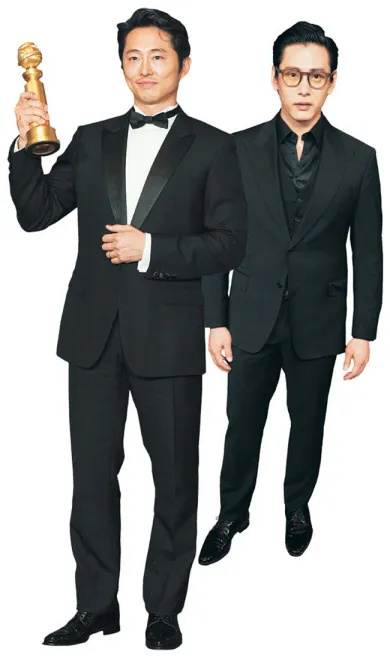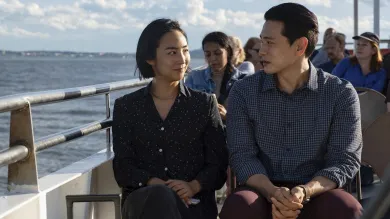From a villain to a melodrama protagonist… Korean men in Hollywood ‘rise in status’

#Scene 1. Actor Steven Yeun won the Golden Globe and Emmy Awards for Best Actor for Netflix’s ‘Angry People.’ He was born in Seoul and moved to the United States at the age of five. He emphasized, “Prejudice and shame are very lonely things, but compassion and grace unite us.”
#Scene 2. Actor Yoo Tae-oh was nominated for the Best Actor award at the BAFTA Awards for the movie ‘Fast Lives.’ In an interview with the New York Times last year, he was thrilled, saying, “As an East Asian actor, it is truly special to play the male lead in a romantic film and be recognized for it, rather than relying on genres such as martial arts or comedy.”
The status of Korean men in Hollywood has been ‘elevated’. Broadly speaking, this is a change in the status of Asian men. Asian men, who were nerds, villains, or low-class citizens who were at best friends with the protagonist, are now expanding their presence as romantic leads and narrative protagonists. Breaking away from the deep-rooted stereotyping of Asian men and taking on characters along the same lines as white men is considered a ‘trend of the times’ and a ‘new daily life’ rather than a ‘glittering effect’.

Steven Yeun is a representative actor who shows the change in the status of Asian men. It has long been an unwritten rule in American Hollywood that in order for an Asian male actor to stand out, he must do martial arts or be funny. Representative examples include actors Li Xiaolong (李小龍, Bruce Lee) and Cheng Long (成龍, Jackie Chan), and comedian Ken Jeong, who played the role of an eccentric in the movie “The Hangover” and the series “Community.”
In contrast, Steven Yeun has chosen to break away from the typicality that Hollywood demands from Asian male actors. When he visited Korea to attend the Busan International Film Festival last year, he said, “The precedents of my predecessors were a stimulus, but they were also an obstacle,” and “The process of breaking them and moving forward was ultimately an experience of creating something new.” He was a pizza delivery clerk in the American drama ‘The Walking Dead’ and has now ‘elevated his status’ as a low-level employee (‘Mayhem’) and now the president of a film company (‘Nob’). For ‘Minari,’ he became the first Korean actor to be nominated for the Best Actor Award at the Academy Awards, and although he ultimately withdrew, he was also cast as a hero in a Marvel movie. Steven Yeun will soon meet audiences around the world with director Bong Joon-ho’s new film ‘Mickey 17’, in which Hollywood capital was invested.

The change in status of Teo Yoo, who is attracting attention with the movie ‘Fast Lives’, is more dramatic. The film is about Na-young (Greta Lee), who immigrated to Canada as a child, and reunites with her best friend from elementary school, Hae-seong (Teo Yoo), in New York after 20 years, and talks about the ‘relationship’ that penetrates the present, past, and future. The American actor who plays Na-young’s current husband, Hae-seong’s potential romantic rival, is relatively small and has an ordinary appearance, so Teo Yoo’s masculinity is rather highlighted. It is also quite significant that actor Park Seo-joon appeared in the movie ‘Captain Marvel’. Although the episode was short, his status as the former lover of the main character, Captain Marvel (Brie Larson) and the prince of a planet, was enough to make you feel like the world was different.
Previously, Korean-American actor John Cho appeared in the 2018 thriller film ‘Search’, becoming the first Asian actor to play the lead role in a mainstream Hollywood thriller film. The film was a commercial success and even spawned a sequel. John Cho said about the changes of the times, “It is true that before our generation, it was difficult to find Asian actors on TV or in movies,” and “It has come to the point where I feel that feeling lonely in the past is already a thing of the past.”
This change is believed to have been influenced by the demand for diversity across Western society, including the United States, the advancement of Asian consumer power, and the novelty of the Korean story, which has been relatively unexplored unlike the Japanese and Chinese stories, as well as the global popularity of K-pop. do. The analysis is that the perception that ‘Asian men are cool’ naturally arose while watching the likes of BTS, who took the Billboard by storm. In 2019, when K-content grew dramatically with the movie ‘Parasite’, Forbes said, “Korea’s popularity and cultural influence have been growing over the past 10 years due to the export of K-pop, K-drama, and Korean movies,” and “Basically, K “Anything with is considered sexy.”
Reporter Lee Jeong-woo krusty@munhwa.com
- Although she started off with concerns… Shin Hye-sun’s ‘healing acting’ captivated viewers.
- Jo Se-ho, his thoughts on his relationship, “I have found someone precious, and I want to be with them for a long time.” [specialty]
- “‘Without blood and tears’, it is different from the provocative KBS daily dramas”
- Sisters who became father-in-law… ‘Tears of Blood’ Lee So-yeon

![Angelina Jolie’s daughter Shiloh turns 18, “Should I go to college or turn professional?” [Overseas Issue]](https://cdn.rubensays.com/wp-content/uploads/2024/01/20240122140656473twpp-1-64x64.webp)

![‘Idol Pick’ Kang Daniel, the idol who looks good with this year’s color ‘Peach Fuzz’ [DA:Chart]](https://cdn.rubensays.com/wp-content/uploads/2024/01/20240122140521443iwgv-1-64x64.webp)

![Jo Se-ho, his thoughts on his relationship, “I have found someone precious, and I want to be with them for a long time.” [specialty]](https://cdn.rubensays.com/wp-content/uploads/2024/01/20240122122249645unhk-1-64x64.webp)
![‘Touch Me’ Samantha Fox, drunk at the highest level ever… Delayed takeoff of plane, causing damage to passengers [Hollywood News]](https://cdn.rubensays.com/wp-content/uploads/2024/01/20240122122006709cknb-1-64x64.webp)
![‘Without blood or tears’ Lee So-yeon and Ha Yeon-joo, sisters who met through their father-in-law…a bloody and cruel narrative [Comprehensive]](https://cdn.rubensays.com/wp-content/uploads/2024/01/20240122121517416hzaz-1-64x64.webp)
![Kim Kardashian and Kanye West meet for children after divorce… Breathtaking atmosphere [Hollywood News]](https://cdn.rubensays.com/wp-content/uploads/2024/01/20240122121434539eczd-1-64x64.webp)
![“It’s different from existing daily dramas”… Confidence of ‘Without blood and tears’ [Comprehensive]](https://cdn.rubensays.com/wp-content/uploads/2024/01/20240122121413487wcqb-1-64x64.webp)
Leave a Reply